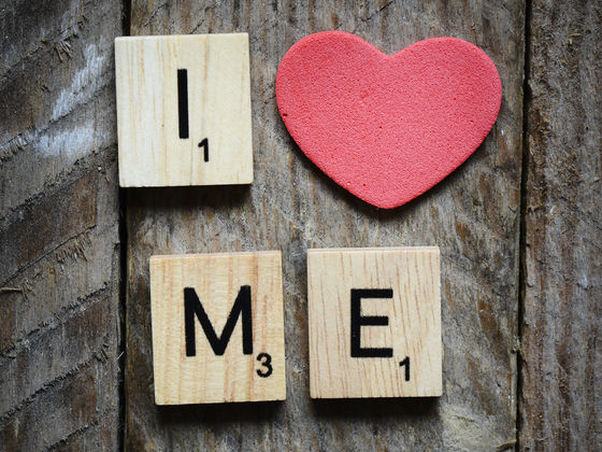
We hear it often: You must love yourself before you can love others. Sounds so cliché; it can be annoying and triggering for some people. Why is that? And why do we HATE to hear it?
Perhaps there’s an inner fear that we have absolutely no idea what that means and how to do that.
Some people think it’s all about self-care. That’s definitely a part of it, but there’s much more to it than that.
So, what does loving yourself look like?
On the other hand, how would we describe ‘self-loathing’? And, how do we demonstrate it?
Watch your thoughts and your emotions – do any of these phrases sound familiar to you?
Those are only a few examples of subconscious thoughts that pop up in our minds – leading to belief patterns that affect the way we feel about ourselves. This eventually ends up playing out in our daily life as action steps we take (reflecting those beliefs) that shut us off from connecting with ourselves and others in loving ways, bringing us down and leading to loneliness, depression, and other negative states.
Relationship troubles and lack of self love:
If we allow it to affect us, self-loathing and the lack of self-love can also sabotage our close relationships.
After the magical phase of falling in love, isn’t it true that most of us begin to get triggered by certain aspects of the other person’s behavior? This is called the “mirror effect.” The mirror effect comes into play whenever our partners reveal, in a very similar way, how we love or do not love ourselves.
An example of this is: If you tend to be really hard on yourself, over time you will start to be as equally hard on your partner, and you may start to hear the echo of your thoughts in their defensive expressions – complaining about how they can never be “good enough” for you.
If you feel unworthy, you will look for evidence in your immediate environment that validates this belief. Having a hard time believing someone loves you, you act out to prove yourself right – for example, you may find yourself overreacting to the slightest comments from your partner that could suggest this is true. As you become more and more defensive and reactive, you drive a wedge between you and your partner, eventually manifesting your greatest fears as the relationship wanes and begins to fall apart.
If you believe you are a failure, you will often retreat from the relationship instead of “rising up” to defend it. For instance, whenever there is even the slightest hint of a relationship challenge, since you only see yourself as defective as opposed to resilient, you retreat into your own self-doubt instead of rising up to meet the challenge. Why would you be strong when things get tough, when you’re only doomed to fail? Another self-fulfilling prophesy ends up being the result.
Do you get the picture? Can you begin to understand why it’s so important to love and forgive ourselves above all else? Our capacity to love is infinite, but we can only love to the degree that we love ourselves.
So yes, the cliché is true.
Here are 6 things you can do to expand your self-love and compassion:
1. Forgive yourself for your past mistakes:
If you have regrets about your past habits, choices and behaviors – make a list of them all and then one by one, fill in the blank as you write the following:
I forgive myself about _________________. That was the best I could do then. However, I know better now, and I’ve learned from that experience. I can now choose something better for myself, and I will. Repeat it daily for awhile, and as you hear yourself saying these things, focus on your heart expanding.
2. Face those fears:
Write down all the things you wish you were doing but you don’t because you’re afraid you are not good enough. Then, repeat the following phrase: I don’t have to be perfect, I can trust myself to try new things and I know it takes practice and time to get good at anything.
3. Remind yourself that you are lovable, and deserve to be loved, just the way you are:
Yes, I said it, just the way you are, with all your imperfections. A good exercise from author Louise Hay is called ‘mirror work’. Every day look in the mirror, look directly into your eyes and say, “I love you.” It might sound silly, but trust me, it is powerful! We came from pure love and without our judgments we would feel just like a baby – lovable and willing to love.
4.Watch your words:
Is there any should ofs, could ofs, always or nevers with regards to yourself and your life? Chances are, you are judging yourself on what you should be doing according to other peoples’ or societies’ opinions. Many people turn 30 and they start feeling copious amounts of shame because they are not where “they are supposed to be.” This creates a sense of immobility and unworthiness and this brings me to my next point.
5. Let go of guilt and shame:
As humans, sometimes we end up hurting others with our decisions. Chances are, it wasn’t intentional. Be gentle with yourself, and trust that you are doing the best you can. Sometimes standing up for yourself or ending an unhealthy relationship can cause pain to another person, but we must stay true to our own personal values. Other times, we might be under high stress and anxiety – periods where we might have reacted harshly against a loved one – that never feels good. But, if we can get back up, dust ourselves off, and explain to others exactly what happened for you, things always have a way of working out.
Feeling guilt and shame can be okay, if we learn from those emotions. However, if we do not shift into forgiveness and cease to carry those two heavy rocks on our backs they can cause a cycle of more pain and more reactivity.
6. Remind yourself of your gifts, qualities and talents:
We all mess up at times. We all are imperfect, with both positive and negative behaviors. Yet, we tend to over-focus on all the negative (or what’s missing or lacking). Instead, why don’t you try reminding yourself of all the great qualities that make you, you. When in doubt, ask a close friend to share with you what he/she loves and admires about you – then, write it all down, and read it as often as you need to.
I’m sure what you’ll discover is that you are a loveable, admirable human being who is worthy of everything life has to offer.
With Love, Leonora.
Perhaps there’s an inner fear that we have absolutely no idea what that means and how to do that.
Some people think it’s all about self-care. That’s definitely a part of it, but there’s much more to it than that.
So, what does loving yourself look like?
- It looks like forgiving yourself for your mistakes.
- It looks like putting down that guilt and shame you have been carrying for so long.
- It looks like being gentle and kind to yourself instead of being overly critical of yourself.
- It looks like giving into perfectionism, and allowing yourself to be imperfect – because that’s all we will ever be.
On the other hand, how would we describe ‘self-loathing’? And, how do we demonstrate it?
Watch your thoughts and your emotions – do any of these phrases sound familiar to you?
- I don’t want to try because I know I will fail.
- I know there’s something wrong with me.
- I’m ashamed of myself for not being where I should be in my life.
- I’m so ugly, too skinny or fat, gross.
- I’m always going to be single.
- Why me?
- If my family, partner or ex partners said I was bad that must be true.
- I’m not lovable.
- I’m such a failure.
- I know I’m not intelligent enough.
- I’m not worthy of good things.
Those are only a few examples of subconscious thoughts that pop up in our minds – leading to belief patterns that affect the way we feel about ourselves. This eventually ends up playing out in our daily life as action steps we take (reflecting those beliefs) that shut us off from connecting with ourselves and others in loving ways, bringing us down and leading to loneliness, depression, and other negative states.
Relationship troubles and lack of self love:
If we allow it to affect us, self-loathing and the lack of self-love can also sabotage our close relationships.
After the magical phase of falling in love, isn’t it true that most of us begin to get triggered by certain aspects of the other person’s behavior? This is called the “mirror effect.” The mirror effect comes into play whenever our partners reveal, in a very similar way, how we love or do not love ourselves.
An example of this is: If you tend to be really hard on yourself, over time you will start to be as equally hard on your partner, and you may start to hear the echo of your thoughts in their defensive expressions – complaining about how they can never be “good enough” for you.
If you feel unworthy, you will look for evidence in your immediate environment that validates this belief. Having a hard time believing someone loves you, you act out to prove yourself right – for example, you may find yourself overreacting to the slightest comments from your partner that could suggest this is true. As you become more and more defensive and reactive, you drive a wedge between you and your partner, eventually manifesting your greatest fears as the relationship wanes and begins to fall apart.
If you believe you are a failure, you will often retreat from the relationship instead of “rising up” to defend it. For instance, whenever there is even the slightest hint of a relationship challenge, since you only see yourself as defective as opposed to resilient, you retreat into your own self-doubt instead of rising up to meet the challenge. Why would you be strong when things get tough, when you’re only doomed to fail? Another self-fulfilling prophesy ends up being the result.
Do you get the picture? Can you begin to understand why it’s so important to love and forgive ourselves above all else? Our capacity to love is infinite, but we can only love to the degree that we love ourselves.
So yes, the cliché is true.
Here are 6 things you can do to expand your self-love and compassion:
1. Forgive yourself for your past mistakes:
If you have regrets about your past habits, choices and behaviors – make a list of them all and then one by one, fill in the blank as you write the following:
I forgive myself about _________________. That was the best I could do then. However, I know better now, and I’ve learned from that experience. I can now choose something better for myself, and I will. Repeat it daily for awhile, and as you hear yourself saying these things, focus on your heart expanding.
2. Face those fears:
Write down all the things you wish you were doing but you don’t because you’re afraid you are not good enough. Then, repeat the following phrase: I don’t have to be perfect, I can trust myself to try new things and I know it takes practice and time to get good at anything.
3. Remind yourself that you are lovable, and deserve to be loved, just the way you are:
Yes, I said it, just the way you are, with all your imperfections. A good exercise from author Louise Hay is called ‘mirror work’. Every day look in the mirror, look directly into your eyes and say, “I love you.” It might sound silly, but trust me, it is powerful! We came from pure love and without our judgments we would feel just like a baby – lovable and willing to love.
4.Watch your words:
Is there any should ofs, could ofs, always or nevers with regards to yourself and your life? Chances are, you are judging yourself on what you should be doing according to other peoples’ or societies’ opinions. Many people turn 30 and they start feeling copious amounts of shame because they are not where “they are supposed to be.” This creates a sense of immobility and unworthiness and this brings me to my next point.
5. Let go of guilt and shame:
As humans, sometimes we end up hurting others with our decisions. Chances are, it wasn’t intentional. Be gentle with yourself, and trust that you are doing the best you can. Sometimes standing up for yourself or ending an unhealthy relationship can cause pain to another person, but we must stay true to our own personal values. Other times, we might be under high stress and anxiety – periods where we might have reacted harshly against a loved one – that never feels good. But, if we can get back up, dust ourselves off, and explain to others exactly what happened for you, things always have a way of working out.
Feeling guilt and shame can be okay, if we learn from those emotions. However, if we do not shift into forgiveness and cease to carry those two heavy rocks on our backs they can cause a cycle of more pain and more reactivity.
6. Remind yourself of your gifts, qualities and talents:
We all mess up at times. We all are imperfect, with both positive and negative behaviors. Yet, we tend to over-focus on all the negative (or what’s missing or lacking). Instead, why don’t you try reminding yourself of all the great qualities that make you, you. When in doubt, ask a close friend to share with you what he/she loves and admires about you – then, write it all down, and read it as often as you need to.
I’m sure what you’ll discover is that you are a loveable, admirable human being who is worthy of everything life has to offer.
With Love, Leonora.


 RSS Feed
RSS Feed
